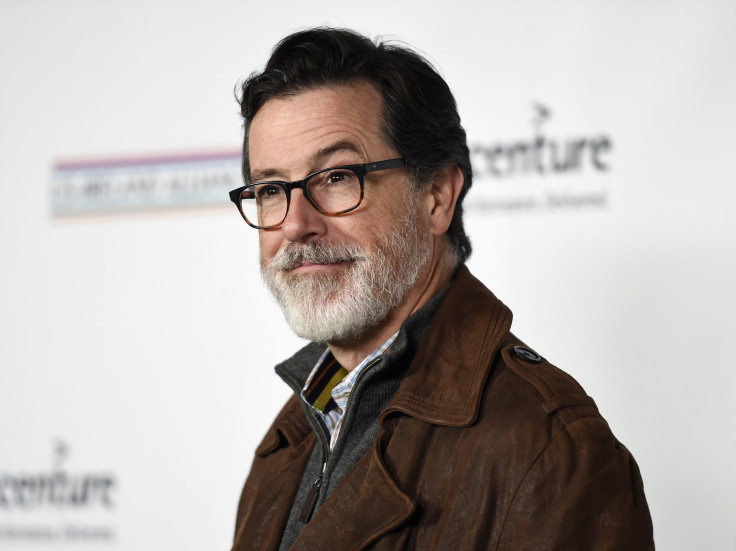Stephen Colbert Is Staying Relevant Before 'The Late Show' Premieres Thanks To Pluto, Eminem And Donald Trump

Colbert season is almost here. “The Late Show With Stephen Colbert” doesn’t premiere on CBS until Sept. 6, but you wouldn’t know that from the Web, where his videos are already doing battle with his future competition in late night television.
In the past month and a half, Colbert has kept himself busy by debuting an app and releasing a string of hilarious videos that range from hosting a Michigan cable access show to spoofing Donald Trump’s presidential bid announcement.
With this big digital push, Colbert, who has been without a show since “The Colbert Report” ended in December, is reminding people who he is, introducing them to Stephen the Comedian and carving his own space in the crowded morning-after-late-night clip wars.
“It’s a great strategy,” Brad Adgate, senior vice president of research at Horizon Media, told International Business Times. “It puts him in the minds of who he wants to reach.”
It’s been eight months since Colbert was truly in the spotlight, or, at least, the subject of morning-after articles on his latest viral stunt or skewering of the right wing. That’s ages in Internet time. As his Sept. 6 premiere date approaches, he needs to start energizing “The Late Show” audience, many of whom have probably ventured elsewhere since David Letterman’s final show in May.
“The Late Show” tends to skew toward older viewers, as do most late night shows. By getting a headstart on the second, third, or fourth screens, Colbert is also reaching out to the coveted demographic
“Doing these kinds of stunts — like interviewing Eminem on cable access — is just kind of a reminder, particularly among 18-34 year olds CBS would like to reach with his show, that he’s around and coming back soon,” Adgate said.
Colbert staged his return in early June when he launched the Colbr app that came loaded with a video called "The Colbeard," in which he shaved the beard he'd grown while on hiatus, and the first in a series of podcasts. Since then, he has debated astronomer Neil Degrasse Tyson about Pluto, reacted to the New York Stock Exchange's shutdown and celebrated the legalization of gay marriage. He's also appeared on Jerry Seinfeld's "Comedians in Cars Getting Coffee." So far "Only in Monroe," the video in which he practicies his interview and hosting skills on cable access show in Michigan, is his most watched video with over 3 million views.
In recent years, late night has become a morning-after affair as the number of hits and shares that clips from the previous night’s episode receives becomes almost as important as how well the episode did in the ratings. Late night shows like NBC's “The Tonight Show with Jimmy Fallon” and ABC's “Jimmy Kimmel Live!” aren’t appointment viewing for younger viewers, so the best way to reach them is to have a strong Web presence.
“I can’t imagine a late night host doing a show now without a very, very prominent Internet component,” Robert Thompson, founder of Bleier Center for Television and Popular Culture at Syracuse University, told IBTimes. “I think [Colbert] wants to have to his internet infrastructure completely in place before he starts that show.”
Right now, Fallon and Kimmel are dominating the morning-after viewing, especially with their recurring features. Segments like “Lip Sync Battle” and “Celebrities Read Mean Tweets” garner millions of views on YouTube. For example, Fallon’s most watched YouTube clip is the lip sync battle between him and Emma Stone, which has 56,492,886 views.
A competitive Web presence will be something new for “The Late Show” because Letterman never really committed to moving beyond the television screen and was never a hit on the Internet. According to Quartz, in Fallon’s first month behind “The Tonight Show” desk in 2014, his best video had 12.61 millions views, whereas Letterman’s best had 0.30 million. In an interview with the New York Times, Letterman himself admitted that he didn’t fully embrace the Web.
“It just came and went without me. It sneaked up on me and went right by,” Letterman told the Times. “People on staff said, ‘You know what would be great is if you join Twitter.’ And I recognize the value of it. It’s just, I didn’t know what to say. You go back to your parents’ home, and they still have the rotary phone. It’s like that.”
Adgate is confident that Colbert will be successful on the internet and confident that he’ll eventually develop his own “Mean Tweets”-like recurring segment that will be a hit with viewers.
If there is one challenge Colbert is facing, it’s himself.
“He doesn’t even have to worry about following the tough act of David Letterman,” Thompson said. “He has to be worried about the tough act of himself. His biggest challenge is that he has a big fan base that loved him on ‘The Colbert Report’ and it’s not going to be that.”
These pre-air videos are meant to introduce audiences to Stephen Colbert, the comedian, and the tone and humor of the forthcoming show. In a sense, it's kind of like a comedian testing out material in a small comedy cellar before taking it on the road for a big national tour or to Madison Square Garden.
© Copyright IBTimes 2024. All rights reserved.






















